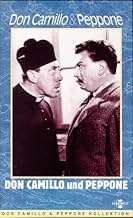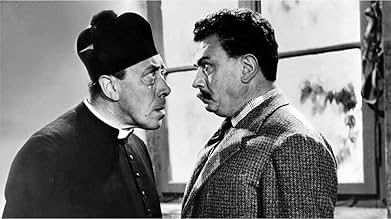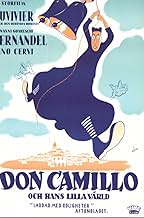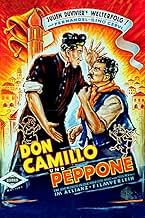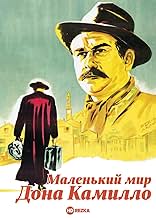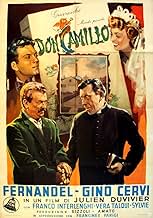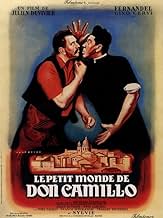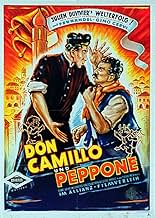AVALIAÇÃO DA IMDb
7,6/10
5,1 mil
SUA AVALIAÇÃO
Adicionar um enredo no seu idiomaA determined priest and a Communist mayor develop a grudging friendship in spite of their official rivalry.A determined priest and a Communist mayor develop a grudging friendship in spite of their official rivalry.A determined priest and a Communist mayor develop a grudging friendship in spite of their official rivalry.
- Direção
- Roteiristas
- Artistas
- Indicado para 1 prêmio BAFTA
- 3 vitórias e 4 indicações no total
Vera Talchi
- Gina Filotti
- (as Vera Talqui)
Charles Vissières
- Il Vescovo
- (as Charles Vissiere)
Clara Auteri Pepe
- Woman saying 'Viva Peppone!'
- (as Clara Auteri)
Manuel Gary
- Il delegato
- (as Manoel Gary)
Avaliações em destaque
I think this is a very funny movie, Despite the fact it is a white&black film and you really can tell that it is placed on a certain time frame (end of 1940's - early 1950's), the plot is fun and universal. It gives you a glimpse of the life on a small Italian town, where simple things turns into hilarious situations, thanks to the strange relationship of friendship/rivalry between Don Camillo and Mayor Peppone. I was lucky to see the original french version (subtitled, of course) which is always better than hearing a translated version. I think that original voices -even if you do not understand the language- reveal the character's feelings, and give credibility to actor's performances. After the film, you get the impression that life is somewhat easier to cope with...
(Since I originally submitted this review to the IMDb, an English-subtitled DVD of "The Little World of Don Camillo" -- and of its first sequel, "The Return of Don Camillo" -- has become available in the US. However, I still think that a fan might be interested looking at in the old dubbed version, if he or she can find it.)
This film is the first in a series of five shot in the 1950s and 60s based on Giovanni Guareschi's well-loved "Don Camillo" stories. The joint Italian-French productions were made with the involvement of the author himself, who wrote screenplays and Italian dialog for various entries in the series; therefore, most consider them to be the official movie versions of the Don Camillo stories. Guareschi is quoted as warmly approving of the way that stars Fernandel and Gino Cervi brought to life his two famous protagonists, the battling parish priest and Communist mayor of a small village in post-war Italy. Today, more than forty years after the series was completed, the films are still played on European television, dubbed into a variety of languages. Unfortunately, however, they are all but unknown to English-speaking fans (particularly American ones) of Giovanni Guareschi and his wonderful characters.
But this need not be, for "Le Petit Monde de Don Camillo" (1951) does exist in an English-dubbed version. The only one of the five films to get the treatment, it is quite well done (once you get around the fact that it's dubbed in the first place). "King of Dubbers" Robert Rietti (Rietty) takes on the roles of both Don Camillo and Peppone, while none other than Orson Welles provides the voice-over narration and, in that capacity, the voice of Christ which Don Camillo hears in answer to his prayers. The narration is intrusive at times (they got their money's worth out of Welles), but the movie overall is a faithful adaptation and interweaving of some of the more memorable early Don Camillo tales.
As the story opens, we meet hot-tempered Don Camillo complaining to the Lord about the recent election of the town's Communist contingent. The new Mayor, Peppone, is a particular thorn in Camillo's side, as the two have had an on-going rivalry which only escalates after the election. Conflicts abound: Peppone wants to have his son baptized "Lenin," but Don Camillo has other ideas. The priest has been trying for years to scrape together the money for a town recreation center, then suddenly the Communists tap an unorthodox source of funds and build their own "People's Palace." Peppone wants to fly the Red banner at a church procession, and he doesn't take Don Camillo's veto well. Don Camillo invests heart and soul into a soccer match between the church's team and the Party's, and he doesn't understand why the Lord declines to take a side. The Communists call a strike against the local landowners, but Don Camillo is determined to save the neglected farm animals. And somehow, amid all the sometimes humorous, sometimes serious conflict, a Catholic "Juliet" and a Communist "Romeo" have fallen in love. Can priest and mayor lay down their fists and help them?
I should add, for the *very* knowledgeable Don Camillo film fan, that the dubbed version of "Little World" is based on the Italian rather than the French cut of the original movie (director Julien Duvivier and the mostly bilingual cast shot the two versions simultaneously). Thus, certain scenes that appeared in the French release but were excised by the censors in stricter Italy will not be in the English version.
I believe the dubbed version of "The Little World of Don Camillo" is still available in vintage video catalogs (that's where I got my VHS edition in 1998), and it's worth looking for, especially for fans of the warm and whimsical tales on which it is based.
This film is the first in a series of five shot in the 1950s and 60s based on Giovanni Guareschi's well-loved "Don Camillo" stories. The joint Italian-French productions were made with the involvement of the author himself, who wrote screenplays and Italian dialog for various entries in the series; therefore, most consider them to be the official movie versions of the Don Camillo stories. Guareschi is quoted as warmly approving of the way that stars Fernandel and Gino Cervi brought to life his two famous protagonists, the battling parish priest and Communist mayor of a small village in post-war Italy. Today, more than forty years after the series was completed, the films are still played on European television, dubbed into a variety of languages. Unfortunately, however, they are all but unknown to English-speaking fans (particularly American ones) of Giovanni Guareschi and his wonderful characters.
But this need not be, for "Le Petit Monde de Don Camillo" (1951) does exist in an English-dubbed version. The only one of the five films to get the treatment, it is quite well done (once you get around the fact that it's dubbed in the first place). "King of Dubbers" Robert Rietti (Rietty) takes on the roles of both Don Camillo and Peppone, while none other than Orson Welles provides the voice-over narration and, in that capacity, the voice of Christ which Don Camillo hears in answer to his prayers. The narration is intrusive at times (they got their money's worth out of Welles), but the movie overall is a faithful adaptation and interweaving of some of the more memorable early Don Camillo tales.
As the story opens, we meet hot-tempered Don Camillo complaining to the Lord about the recent election of the town's Communist contingent. The new Mayor, Peppone, is a particular thorn in Camillo's side, as the two have had an on-going rivalry which only escalates after the election. Conflicts abound: Peppone wants to have his son baptized "Lenin," but Don Camillo has other ideas. The priest has been trying for years to scrape together the money for a town recreation center, then suddenly the Communists tap an unorthodox source of funds and build their own "People's Palace." Peppone wants to fly the Red banner at a church procession, and he doesn't take Don Camillo's veto well. Don Camillo invests heart and soul into a soccer match between the church's team and the Party's, and he doesn't understand why the Lord declines to take a side. The Communists call a strike against the local landowners, but Don Camillo is determined to save the neglected farm animals. And somehow, amid all the sometimes humorous, sometimes serious conflict, a Catholic "Juliet" and a Communist "Romeo" have fallen in love. Can priest and mayor lay down their fists and help them?
I should add, for the *very* knowledgeable Don Camillo film fan, that the dubbed version of "Little World" is based on the Italian rather than the French cut of the original movie (director Julien Duvivier and the mostly bilingual cast shot the two versions simultaneously). Thus, certain scenes that appeared in the French release but were excised by the censors in stricter Italy will not be in the English version.
I believe the dubbed version of "The Little World of Don Camillo" is still available in vintage video catalogs (that's where I got my VHS edition in 1998), and it's worth looking for, especially for fans of the warm and whimsical tales on which it is based.
French comic actor Fernandel embodied the title role while remarkable Italian character actor Gino Cervi played his spiritual and political opponent. More than a rustic comedy, the film epitomizes the postwar political polarization in Italy and symbolizes the famous "compromesso storico"---historical compromise---under which Italy would long continue to be governed. This successful film spawned a series of popular sequels, mostly with the same two actors, all based on the Giovanni Guareschi novels. A point of clarification: this was a French-Italian co-production and was first released in the U.S. in its French-language version with English subtitles before the dubbed English version with narrator Orson Welles went into circulation. The Italian-language version, not readily available, is the most appropriate one.
This is, and has been since I was a young boy, one of my favorite movies.
It's the story of a Catholic priest and a Communist mayor who are each others worst enemy and best friend. The dialogs are just great, but what I like most about these movies (there a are 5 in total) is that both main characters (Don Camillo and Peppone) are "real people". They act on impulse, say one thing but think the other, manipulate... they are real humans. When one of Peppone's people dies and asks for the church-bells to be rang at his funeral, Don Camillo refuses because he was no Catholic. Peppone orders a big bell to be placed in the town square which Don Camillo sabotages. The bell is broken and sounds horrible but at the end, Don Camillo rings his bells because "by asking for the bells, the boy was asking for God". This is one of these typical things I like about these movies.
I've got the good fortune I also understand French and can watch these movies in that language. I can't imagine what they would sound like in English but I would advice anyone to watch them in the French version. I hate dubbed movies and can't imagine Fernandel speaking English (although in one movie he does which is hilarious). But in all, I think even the English version still is one of the best movies ever made.
If you're not prejudiced against black and white and foreign movies, this is a movie you have to see. If you are, you don't know what you're missing.
It's the story of a Catholic priest and a Communist mayor who are each others worst enemy and best friend. The dialogs are just great, but what I like most about these movies (there a are 5 in total) is that both main characters (Don Camillo and Peppone) are "real people". They act on impulse, say one thing but think the other, manipulate... they are real humans. When one of Peppone's people dies and asks for the church-bells to be rang at his funeral, Don Camillo refuses because he was no Catholic. Peppone orders a big bell to be placed in the town square which Don Camillo sabotages. The bell is broken and sounds horrible but at the end, Don Camillo rings his bells because "by asking for the bells, the boy was asking for God". This is one of these typical things I like about these movies.
I've got the good fortune I also understand French and can watch these movies in that language. I can't imagine what they would sound like in English but I would advice anyone to watch them in the French version. I hate dubbed movies and can't imagine Fernandel speaking English (although in one movie he does which is hilarious). But in all, I think even the English version still is one of the best movies ever made.
If you're not prejudiced against black and white and foreign movies, this is a movie you have to see. If you are, you don't know what you're missing.
I have recently watched so many American gangster and noir films that I felt I needed something different for a change. What better than a French-Italian co-production from the immediate post-war period? It got to be 'The Little World of Don Camillo'. Fernandel plays the eponymous priest of a small town in Northern Italy who is the friend and enemy of the newly elected communist mayor 'Peppone' Bottazzi (Gino Cervi with a moustache that makes him look like Stalin). The film, set in 1946, concerns Camillo and Peppone's friendly quarrels about how best to serve their little town (the 'little world' of the title): they want the same things but differ about the best ways to get them. Director Julien Duvivier has adapted episodes from Guareschi's novel and cleverly intervove them so that they make up a charming and amusing whole: a film that's heartwarming and funny, though there are no moments when you laugh out loud. Fernandel is outstanding and Cervi does very well as his frenemy. The picture is interesting non the least because it offers a glimpse of life in post-war Italy and an insight into the political and social atmosphere of the time. Highly recommended!
Você sabia?
- CuriosidadesThe whole film was shot twice; there is a French and an Italien negative, that can be distinguished by details in editing and content (watch the position of the dog during the procession for example).
- Citações
Crocefisso: Where did you get that cigar, Camillo?
Don Camillo: Peppone had two. I think I took it without asking him. You know he believes in equal distribution of wealth.
- Versões alternativasGerman version runs 2 minutes shorter than the Italian original version.
- ConexõesFeatured in Cinema forever - Capolavori salvati (2001)
Principais escolhas
Faça login para avaliar e ver a lista de recomendações personalizadas
- How long is The Little World of Don Camillo?Fornecido pela Alexa
Detalhes
- Data de lançamento
- Países de origem
- Idiomas
- Também conhecido como
- Don Camillo
- Locações de filme
- Empresas de produção
- Consulte mais créditos da empresa na IMDbPro
- Tempo de duração1 hora 47 minutos
- Cor
- Proporção
- 1.37 : 1
Contribua para esta página
Sugerir uma alteração ou adicionar conteúdo ausente

Principal brecha
By what name was O Pequeno Mundo de Don Camilo (1952) officially released in India in English?
Responda
